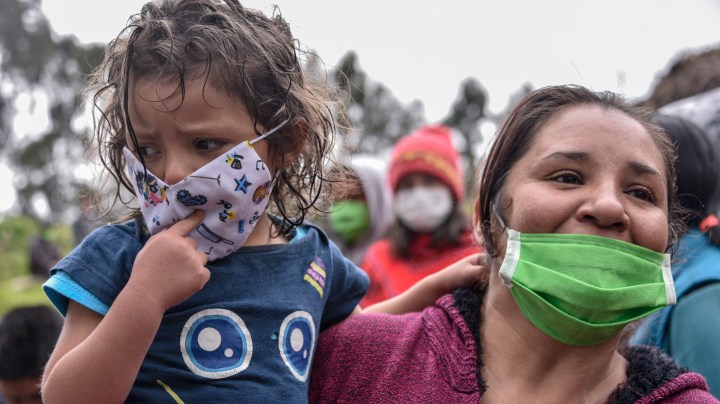Nearly Half of Colombia’s Healthcare Workers Consider Resignation Amid Plans to Reopen

A woman holds her daughter while she waits to receive food aid as Colombian military visit the El Codito neighborhood handing out family food baskets during government-ordered obligatory quarantine on April 23, 2020 in Bogota, Colombia. Photo by Guillermo Legaria/Getty Images
The decision to reopen economies has received mixed reactions across Latin America. Skeptics have pointed out that gradually getting people back out of their homes might backfire and result in more contagion—further complicating the issue.
In Colombia, President Ivan Duque plans to move forward and lift restrictions in a third of the country. The idea has frustrated many medical workers who have threatened to quit if they don’t get the gear they need to protect themselves and others.
Colombia Reports writes that the healthcare community, led by the Colombian Medical Federation (FMC), has growing concerns after Duque announced he would soften restrictions for about 15 million Colombians starting May 12. Previously, Duque had shut down schools, flights and many businesses, noting that the country’s healthcare system couldn’t take too much of a strain—especially because Colombia has also been watching for outbreaks in its neighboring Venezuela.
However, healthcare experts now say that the plan is dangerous. An FMC poll revealed that 80% of medical employees never received protective equipment they needed.

Such lapses in gear and appropriate protection can be catastrophic if virus numbers ramp up as certain areas reopen. Currently, the South American country has had about 8,600 cases and roughly 400 confirmed deaths. However, from what we’ve seen, the virus spreads quickly and could easily overwhelm vulnerable healthcare systems. The same poll showed that 40% of medical workers said they would consider quitting due to fears that they could get infected or infect others.
“The government has just made a risky decision, I [can] not call it good or bad because the available information is not sufficient to do so. What is clear is that there [is] no data available that would allow us to say that there is an evident slowdown in the contagion curve,” Camilo Prieto, a medical investigator, said per Colombia Reports.
Despite the concerns, Duque has not indicated he’s going to back out of the May 12 decision. He’s not alone; Peru has also said it “must begin economic activities and seek balance to generate jobs” as the economy takes a plunge, and Chile is figuring out a plan to issue “release certificates” that identify patients who have recovered from the virus. There’s a lot to balance, and it’ll be hard to know what decisions are the right ones—and once we do, it could be too late for some.
